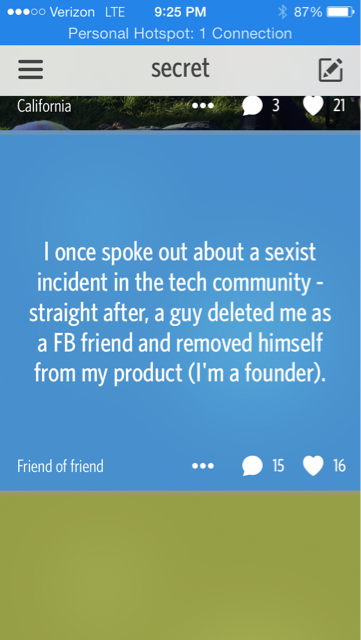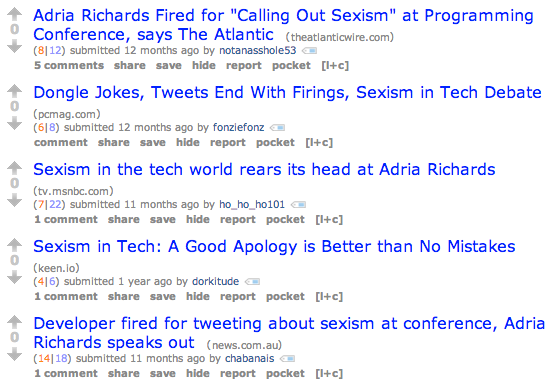Last week, GitHub’s first female developer, Julie Ann Horvath, quit the company over a staggering string of allegations that while working there she was subjected to harassment, intimidation, and sexism in the workplace. Considering Horvath also launched GitHub’s Passion Projects initiative to recruit more women into the Open Source community, this was quite a loss. GitHub has responded by putting the founder at the source of her claims on leave pending an investigation.
In discussing what to do in response to the GitHub debacle, we floated the inevitable idea: write about how every woman who ever makes an issue of sexism in tech culture or geek culture is routinely subjected to backlash or harassment.
I didn’t want to write that article. I always write those articles, and I am exhausted.
In the days to come, you’ll read think pieces that examine sexism in Open Source communities. You’ll read roundups of similar issues in tech and geek culture, like the ones we’ve written many times over. You might even hear of the inevitable backlash and harassment that always seems to follow whenever a woman speaks about sexism in tech or geek culture.
But if there’s one thing to take away from what happened to Horvath, it’s a glimpse of a culture in which women’s voices are silenced, the same thing we learned from Joanna Russ’s landmark exploration of the systemic marginalization of women in publishing.
Here’s a guide for the uninitiated.

Photo by MipsyRetro/Flickr remix by Jason Reed
Make sure that demeaning women is built into the foundations of the educational system that prepares them for STEM fields. Make sure you let women as a group know how little you value them when you hire men to build more products that men like. Make sure to pepper your speech, at the most fundamental level, with sexist (and racist, queerphobic) slurs.
Build products that remind women that they’re objects for your consumption, then proudly display them at tech conventions. Make it clear that whatever women are doing around programming, it can’t possibly be worthwhile or comparable to the truly important work of their male counterparts.
If she manages to get hired despite your best efforts, make sure that you pay her less than half of what men make—49 cents to every dollar men earn. Revise your opinion of her upon discovering that she’s a woman. Openly belittle and reject her professional credentials. Turn professional conversations with her into opportunities to ask her for sex. If she says no? Ban her from your tech conference.
Make sure she knows that whatever her level of actual talent might be, her most important assets are T&A for the men around her to enjoy. Make sure you alternately objectify her or pretend she’s invisible when she attends tech conventions, and never, ever, encourage her to speak, because you might not like what she has to say.
If she starts opening her mouth and talking anyway? Dismiss her as frigid, or call her a whore, or of course, “bossy.” If she complains about how she’s being treated? Tell her not to get “personal,” to “watch your tone” and “take it offline,” to suck it up because hurling abuse at women is just “part of the culture.”

Oh, and ask more men to join you in ordering her to “shut your fucking face, bitch.”
Make sure she knows she’ll be punished for opening her mouth.
Is she still talking? Quick, find excuses to stop listening. Brand certain words as buzzwords that signal that an Agenda is taking place. Make sure as soon as someone drops a buzzword you stop listening.
Privilege. Intersectionality. Misogyny. If words like these find their way into a conversation, take that as a signal to downvote that conversation, or dismiss the person who used them as an angry social justice warrior. Make it clear you don’t approve of anyone who might be a feminist with an agenda coming into your environment and looking for “storms in teacups” to get upset about.

If she keeps talking after all this? Time to get serious.
Is she trying to talk about the way your industry’s products hurt women? Send her death threats. Did she have the audacity to get hit on by a fellow con-goer or sexually harassed by her own boss at a tech conference? Death threats. Is she a female game developer who admitted she didn’t like to play certain kinds of games? Harass her for years until she finally quits her job in order to protect her family from death threats. Did she call out the men sitting behind her at a tech conference? Send her death threats and DDOS her employer’s website until she gets fired and goes into hiding.
Heck, just harass her because she’s a woman. Harass the head of Xbox for being a woman. Harass the community moderator of a gaming project because she’s a woman. Did she try to encourage more participation from other women in Open Source projects? Death threats.
And after all that, when she finally has enough and quits, as the 52 percent of women who leave STEM-related careers have done, citing “hostile macho cultures” as the No. 1 reason?
Make sure you imply that it was their own fault, because they just don’t have the manly stamina required to succeed.
But then, how to get rid of all that pesky girly code she left behind?
Do what Horvath’s allegedly spurned male coworker at GitHub did:
Go through and rip it out.
Photo by MipsyRetro/Flickr remix by Jason Reed (CC BY-SA 2.0)
